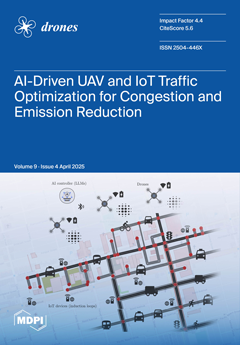Open AccessFeature PaperArticle
Offshore Wind Farm Delivery with Autonomous Drones: A Holistic View of System Architecture and Onboard Capabilities
by
Simon Schopferer, Philipp Schitz, Mark Spiller, Alexander Donkels, Pranav Nagarajan, Fabian Krause, Sebastian Schirmer, Christoph Torens, Johann C. Dauer, Sebastian Cain and Vincenz Schneider
Viewed by 1719
Abstract
Maintenance of offshore wind farms requires the transportation of tools and spare parts in close coordination with the deployment of technicians and the cost-intensive shutdown of the wind turbines. In addition to ships and helicopters, drones are envisioned to support the offshore transportation
[...] Read more.
Maintenance of offshore wind farms requires the transportation of tools and spare parts in close coordination with the deployment of technicians and the cost-intensive shutdown of the wind turbines. In addition to ships and helicopters, drones are envisioned to support the offshore transportation system in the future. For cost-efficient and scalable offshore drone operations, autonomy is key to minimize the required infrastructure and personnel. In this work, we present a system architecture that integrates the key onboard capabilities for autonomous offshore drone operations: onboard mission and contingency management, en-route trajectory planning, robust flight control, safe landing, communication management, and runtime monitoring. We also present technical solutions for each of these capabilities and discuss their integration and interaction within the autonomy architecture. Furthermore, remaining challenges and the feasibility of autonomous drone operations for offshore wind farm cargo delivery are addressed, contributing to the realization of this vision in the near future. The work presented here summarizes the results of autonomous cargo drone operations within the UDW research project, a joint project between the German Aerospace Center (DLR) and the energy supplier EnBW.
Full article
►▼
Show Figures





